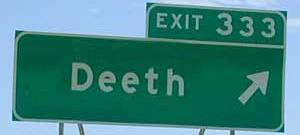The Rock of Sisyphus Part 3: The Good News
2010 was a sucky year for Democrats. You can't spin a 63 seat loss in the US House. But as we saw in the first part of this series, a lot of those Republican gains -- 38 to be precise -- were simply the re-taking of seats the Democrats won in 2006 and 2008.
Yesterday, we looked at the real trend: a Southern-dominated shift to the Republicans of 26 seats that were Democratic going into 2006 to the Republicans. But so I don't depress my Democratic readers too much before Christmas, today we look at the counter-trend: seats that switched to the Democrats in 2006 and 2008 and stayed there in 2010. (Unfortunately, this is the shortest installment. And thanks to reader hawkeye77 for a couple corrections.)
We start right here in Eastern Iowa. This, of course, is what got me thinking about the whole thing. In 2006 Bruce Braley and Dave Loebsack both won seats that had been Republican since the 1970s. The circumstances were very different: Braley was a well-funded open seat favorite while Loebsack was a “no-chance” challenger. But both have consolidated their wins and settled in, even though Braley had a scare this year and with Iowa losing a seat all bets are off.
But the biggest success story is Connecticut, as the last of the New England moderate Republicans fell. Joe Courtney over Rob Simmons was one of the biggest upsets of 2006, and Chris Murphy knocked off Nancy Johnson. Chris Shays survived two more years before falling to Jim Himes in 2008, and Connecticut now has an all-Democratic House delegation. Almost makes up for Joe Lieberman. But not quite.
Here are the other 2006 and 2008 wins that held in 2010:
Arizona 8: Gabrielle Giffords took over from long-term moderate Republican Jim Kolbe in 2006 and, despite a tough 2010, is still standing.
California 11: Democrat Jerry McNerny was one of 2006’s biggest upsets when he knocked off Richard Pombo. What’s most interesting is that California is so expertly gerrymandered that, even with three consecutive wave elections, this is the only one of the state’s 53 seats that has changed parties even once in the decade.
Colorado 7: Democrat Ed Perlmutter took over in 2006 when Republican Bob Beauprez stepped down in an unsuccessful run for governor. Perlmutter survived a close one this year.
Indiana 2: Joe Donnelly beat Chris “Count” Chocola (the nickname was inevitable) and is the only one of the three Indiana gains from 2006 to survive.
Kentucky 3. One of the surprises here is that we're up one in Kentucky. John Yarmuth upset Anne Northup in the state's most urban seat, Louisville's 3rd, in 2006, won a rematch in 2008, and took a third term this year.
Michigan 9: Democrat Gary Peters took over from Republican Joe Knollenberg in 2008.
Minnesota 1: Tim Walz beat Class of 94 Republican Gil Gutknecht in this souther tier of the state seat in 2006 and has held on since.
New Mexico 1. Martin Heinrich took the open seat in 2008 and survived this year.
New York 23. The district that added “Scozzafava’d” to the political dictionary, as the Tea Party scuttled the official GOP nominee in a 2009 special. Democrat Bill Owens took advantage of the Republican split for the Democrat's first win since before there was a Republican Party. Seriously. The GOP won this from the Whigs and Know-Nothings in about 1856. With capital c Conservative Doug Hoffman meddling yet again this fall, Owens won a full term.
North Carolina 8 and 11. Would you believe Democrats are actually UP a seat in North Carolina since 2006? Of course, when you’re talking about Blue Dogs Heath Shuler (elected 2006) and Larry Kissell (who won in `08 after a near miss in 2006) that’s not saying much.
Virginia 11. Democrat Gerry Connolly took over when non-insane Republican Tom Davis retired in 2008; of our three Virgina gains that year only Connolly survived.
So that's 17 Democratic gains since 2006 that have held. There was also one new Democratic gain this year and two recoveries from fluke Republican wins.
Lost in the shuffle of Christine "I'm Not A Witch" O'Donnell's Senate primary upset of Delaware Rep. Mike Castle, and her subsequent general election loss, was Democrat John Carney's easy takeover of Castle's House seat.
Hawaii has weird special election rules: It's first-past-the-post, no primary, and no runoff special. A Democratic split allowed Republican Charles Djou to win a partial term in May. The 1st district special became a de facto Democratic primary; Colleen Hanabusa, who finished second to Djou in May. won in November.
But the best fluke of all was Republican Joseph Cao in New Orleans. How lucky can you get? Incumbent William Jefferson gets caught with 90 large in literally cold hard cash in his freezer. The Democrats line up around the block to primary him and splinter the vote, and Louisiana has an unusual runoff date, so your final round is without Barack Obama on the top of the ticket in your black majority district. You also have a Green Party candidate to pull votes from Democrats too disgusted to vote for Jefferson. That kind of alignment is about as rare as an eclipse on winter solstice day, and that kind of luck runs out fast. Democrat Cedric Richmond can settle in with nothing to worry about but primaries.
So looking at the 12 Democratic gains by state since 2006:
Up three seats in Connecticut and two here in Iowa.
Up one each in Arizona, California, Delaware, and New York.
Unbelievably up one seat each in Indiana, Kentucky, and North Carolina.
That leaves the Democrats ten seats short of where we were going into 2006. In this recent cycle of wild swings and waves, that's not too far to push a rock in one election.

No comments:
Post a Comment